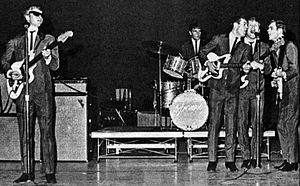The Astronauts (band)
| The Astronauts | |
|---|---|

The band in 1966.
|
|
| Background information | |
| Origin | Boulder, Colorado, US |
| Genres | Rock and roll, surf rock, pop |
| Years active | 1961–1968 |
| Labels | Palladium, RCA Victor |
| Past members | Rich Fifield Jon "Storm" Patterson Bob Demmon Dennis Lindsey Jim Gallagher Dick Sellars Mark Bretz Rod Jenkins Robert Carl McLerran |
The Astronauts were an American rock and roll band, who had a minor hit in 1963 with "Baja" and remained successful for several years, especially in Japan. They have been described as being, "along with...(the) Trashmen, the premier landlocked Midwestern surf group of the '60s." For most of their career, the band members were Rich Fifield, Jon "Storm" Patterson, Bob Demmon, Dennis Lindsey, and Jim Gallagher.
The Astronauts developed out of a group, The Stormtroopers, which was originally formed at Boulder High School, Boulder, Colorado in 1956 by Jon "Storm" Patterson (vocals, guitar), Robert Graham "Bob" Demmon (guitar), and Brad Leach (drums). In 1961, they became The Astronauts after adding Richard Otis "Rich" Fifield (vocals, guitar) and Dick Sellars (guitar), the change of band name recognising the fascist connotations of the previous name and to pay tribute to local hero, astronaut Scott Carpenter. Patterson switched to bass, Leech was replaced on drums by Jim Gallagher, and soon afterwards Sellars left to join the US Navy, being replaced by Dennis Lindsey. With a line-up of Demmon, Patterson, Fifield, Lindsey and Gallagher, the band gained a strong local reputation, toured as far as Chicago and Dallas, Texas, and released their first single, "Come Along Baby", in 1962, on the small Palladium label. They were signed to RCA Records after a record company executive was impressed by their performance at a local night club, the Tulagi.
Their first single on RCA was "Baja", an instrumental written by Lee Hazlewood originally for his friend, guitarist Al Casey. Released by The Astronauts in early 1963, the track was described as "a typical surf instrumental with a reverberation-heavy twangy guitar and driving drumbeat", and reached # 94 on the Billboard Hot 100 for just one week, the pinnacle of their US chart career. However, they released a succession of further singles on RCA, in an attempt by the record company to emulate the success of the Beach Boys and other surf music-related groups in the charts at the time. According to reviewer Richie Unterberger, "the group shone brightest on their instrumentals, which used mounds of Fender reverb and two rhythm guitars; when they sang, the results were much less successful." Patterson and Fifield shared lead vocals, and the band recorded songs by Roger Christian, Gary Usher, Dick Dale and Henry Mancini, among others. Fifield, the lead guitarist, used a Fender Jazzmaster on the recordings, with an early prototype reverb unit personally loaned to the group by Leo Fender. Their 1965 song "Tomorrow's Gonna Be Another Day was covered by The Monkees in 1966.
...
Wikipedia
